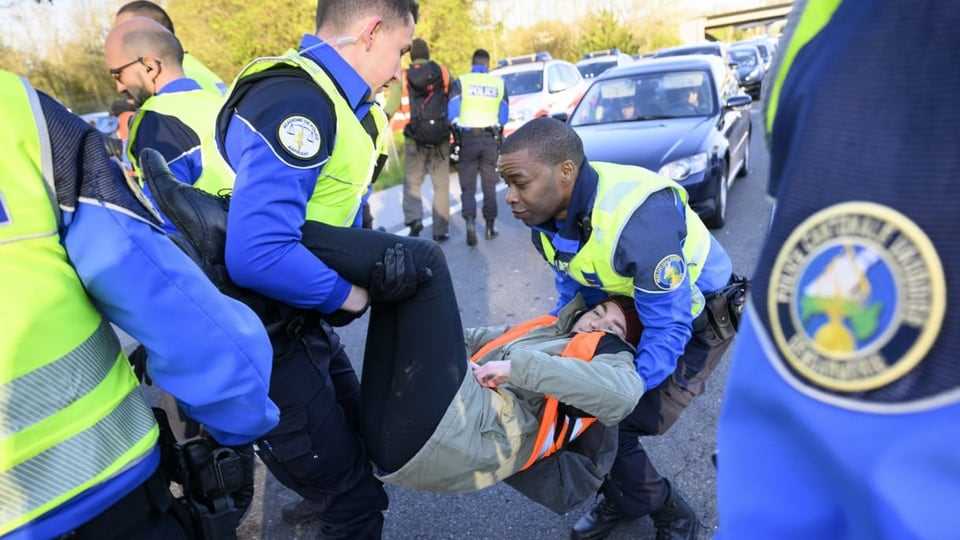contents
They should not get away with this action scot-free: Twelve climate activists paralyzed traffic at the Bern-Wankdorf motorway exit on Tuesday morning. “Six people glued themselves to the road, among other things,” says Magdalena Rast, media spokeswoman for the Bern cantonal police.
Legend:
A climate activist from the “Renovate Switzerland” movement is sitting on April 19, 2022 in the middle of the Bern-Wankdorf motorway exit.
key stone
Traffic stood still for half an hour. Responsible for this: Renovate Switzerland. The Bern cantonal police took those involved to the station. Rast says: “Anyone who actively participated in the campaign must expect a display.”
The blockades are quite dangerous – and not only for the demonstrators, said Rast. The backwater could lead to rear-end collisions, and rescue vehicles could not get through.
threatened with fines
The motorway blockade in Bern-Wankdorf is the third within a short time: Already last week activists from Renovate Switzerland Motorway exits blocked in Geneva and Lausanne.

Legend:
On April 11, 2022, Renovate Switzerland blocked a motorway exit in Lausanne.
key stone
The action is reminiscent of a sit-in in Zurich in 2020: around 250 demonstrators from the environmental group Extinction Rebellion blocked the Quaibrücke for three hours. The Zurich District Court then sentenced a law student to a conditional fine of 15 daily rates of CHF 20 each for coercion. The verdict is not yet legally binding. And in 2019, climate activists from Extinction Rebellion blocked an important thoroughfare in Lausanne. There, too, those involved received conditional fines in February, and the activists have announced an appeal.
Previous forms of action have had their day
Why do people keep resorting to such illegal means, putting themselves in direct danger, accepting financial consequences and, with an entry in the criminal record, also career-damaging consequences? Historian and sociologist Milo Probst conducts research at the University of Basel on criticism of environmental destruction and the social issues associated with it. He says there are several catalysts for the actions described: On the one hand, the extent of the climate problem, on the other hand, the inaction of the decision-makers in governments and corporations. “In addition, the activists have realized that previous forms of action have not been fruitful and have not led to any concrete changes.”
Activists disrupt public order with the aim of sparking debate.
Mass demonstrations, for example, would quickly become routine and would lose their symbolism as a result. This makes people resort to civil disobedience as a form of action. Say: “You commit a non-violent breach of the rule and disturb public order with the aim of drawing attention to a problem and triggering a debate.”
The achievements of civil disobedience
Historically, according to Probst, such acts of civil disobedience have been able to bring about change. The women’s rights movement is an example of this. “The blockade of banks has also triggered a public discussion about the responsibility of the Swiss financial center in the climate issue.”
The climate movement should focus more on addressing large and powerful actors.
The doctoral student, who is himself active in the climate movement, does not want to comment on the usefulness of sit-ins on the freeway during commuter times. He thinks it makes sense to be disruptive. But: “The climate movement should focus more on addressing large and powerful actors and fewer people who have very little influence on major political decisions in everyday life.”
